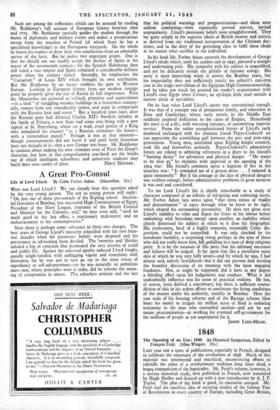A Great Pro-Consul
Life of Lord Lloyd. By Colin Forbes Adam. (Macmillan. 21s.)
WHO was Lord Lloyd ? We can already hear this question asked by the very young persori. The not so young person will reply : "Oh just one of those pro-consuls of the Kipling school. Success-
' ful Governor of Bombay, less successful High Commissioner of Egypt, President of the Navy League, chairman of the British Council and Minister for the Colonies, and," he may even add, " until he made good in the last office, a reactionary malcontent and an embarrassment to his contemporaries."
Now there is perhaps some substance in these two charges. The best years of George Lloyd's maturity coincided with the two inter- war decades when his passionate beliefs were despised and his persistency in advocating them derided. The 'twenties and 'thirties exhaled a fog of cynicism that permeated the very arteries of social and public life. Against the universal apathy induced Lloyd fought, usually single-handed, with unflagging vigour and sometimes with bitterness, for he was not to turn an ear to the siren voices of expediency or self-advancement—yet he was naturally an ambitious man—nor, where principles were at stake, did he tolerate the mean- ing of compromise in others. This relentless attitude and the fact that his political warnings and prognostications—and these were seldom comforting—were repeatedly proved correct, invited unpopularity. Lloyd's passionate beliefs were straightforward. They lay quite simply in the superior ideals of British honour and justice, as derived from our traditional interpretation of the Christan doc- trines, and in the ditty of the governing class to fulfil these ideals at no matter what sacrifice to the individual.
In his book Mr. Forbes Adam unravels the development of George Lloyd's ideals which, until his sudden end in 1941, pursued a straight and undeviating path. His sympathy with his subject is unqualified, and yet he delicately avoids the pitfalls of fulsome eulogy. His story is most interesting when it covers the Bombay years, but his impartiality does not sufficiently justify his subject's cast-iron case in the tragic anti-climax of the Egyptian High Commissionership, and he takes too much for granted his reader's acquaintance with Lloyd's own Egypt since • Cromer, an apologia little read outside a narrow circle of specialists.
On its face value Lord Lloyd's career was conventional enough. It was that of a younger son of prosperous family, and education at Eton and Cambridge, whose early travels in the Middle East suddenly inspired dedication to the cause of Empire. Henceforth the story is of a life, with wavering fortunes, of unremitting imperial service. From the rather unsophisticated letters of Lloyd's early manhood exchanged with his intimate friend Pepys-Cockerell we can appreciate the astonishing gulf between the pre- and post-1914 generations. Young men, nourished upon Kipling knight errantry, took life and themselves seriously. Pepys-Cockerell's admonitory letters are related to admiring references in a diary to his friend's " burning desire " for adventure and physical danger. " He wants to be shot at," he exclaims with approval at the opening of the 1914 war. His friend's comment upon a baptism of fire in the trenches was : " It reminded me of a grouse drive . . . I enjoyed it quite immensely." But if his courage in the face of physical dangers was reckless enough, before administrative problems of great moment it was cool and considered.
To me Lord Lloyd's life is chiefly remarkable as a study of character composed of an infinity of intriguing and endearing facets. Mr. Forbes Adam lays stress upon " that extra ration of vitality and determination " to carry .through what he knew to be right, which shaped his outstanding personality. He does not gloss over Lloyd's inability to relax and digest the fruits of his labour before embarking with herculean energy upon another, an inability which clearly distressed his subject as much as it does his biographer. His restlessness, bred of a highly romantic, essentially Celtic dis- position, could not be controlled. It was only checked by his inordinate humility, a surprising virtue perhaps in the eyes of those who did not really know him? bfft unfailing in a man of deeP religious piety. It is by the measure of this piety that his ultimate successes and failures will be judged. It lay upon him like a protective outer skin of which he was very fully aware—and by which he w, s, I had almost said, naively bewildered—but it did not prevent him inviting the broadest discussion of its meaning with the most engaging frankness. Nor, as might be supposed, did it have in any degree a blinding effect upon his judgements and conduct. What it did undoubtedly influence was his sense of practical realities. He has, of course, been dubbed a reactionary, but there is sufficient contra- diction of this in his ardent efforts to ameliorate the living conditions of the masses under his authority, notably in Bombay. Here the vast scale of his housing reforms and of the Barrage scheme (hat bears his name) to irrigate six million acres of Sind is enduring testimony to the man who counselled caution—and not by any means procrastination—in working for eventual self-government for the millions of people as yet unprepared for it.
JAMES LEES-MILNE.






































 Previous page
Previous page